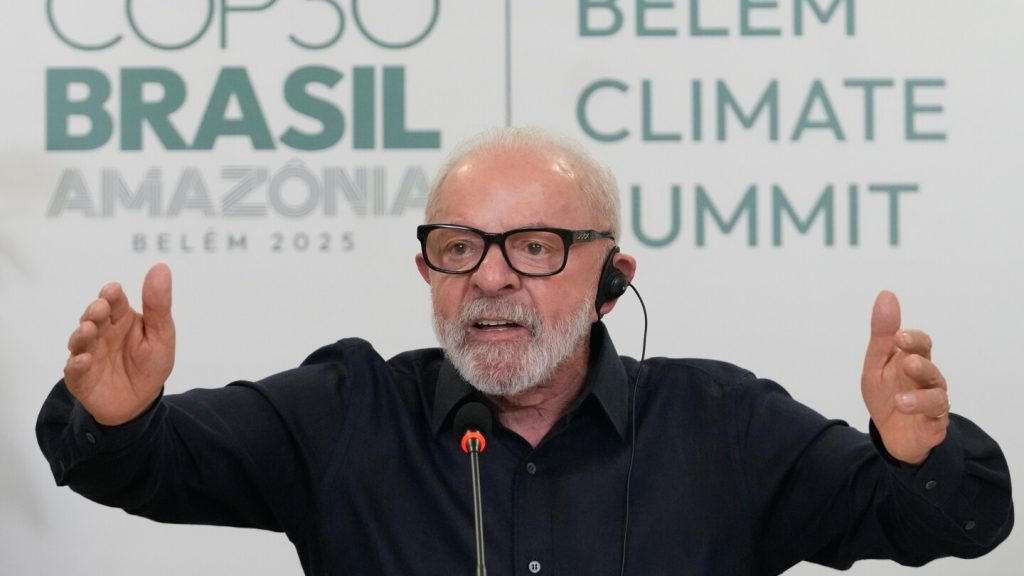Listen to the article
Brazilian President Lula Proposes New Approach to Amazon Rainforest Preservation
Brazilian President Luiz Inácio Lula da Silva unveiled his vision for Amazon rainforest protection ahead of the United Nations’ climate summit COP30 in Belem, Brazil. Rather than depending on traditional donations from wealthy nations and philanthropies, Lula is pushing for a comprehensive fund that would financially reward countries for preserving their forests.
“I don’t want to say the word donation any longer,” Lula told reporters in Belem, a Brazilian city on the edge of the Amazon. “Someone gives us $50 million. It is nice, but that’s nothing. We need billions to deal with our problems, problems of people who are living there.”
The initiative, named the Tropical Forests Forever Fund (TFFF), aims to support more than 70 developing countries that commit to forest preservation. Colombia, Ghana, the Democratic Republic of Congo, Indonesia and Malaysia have already joined the coalition. Several developed nations, including Germany, the United Arab Emirates, France, Norway, and the United Kingdom, are helping design the mechanism and are expected to be its first investors.
According to the COP30 website, the TFFF is envisioned as a “permanent trust fund” with significant leverage potential, generating approximately $4 from the private sector for every $1 contributed. While specific details about the fund’s operations remain limited, forests can generate revenue through various means beyond resource extraction, including tourism and carbon offset programs where companies pay to neutralize their emissions through forest conservation efforts.
“Brazil has already invested $1 billion, and this will bring revenue to investors,” Lula explained. “It is a win-win fund. We hope that when we finish the TFFF presentation many countries join.”
The proposal represents a significant shift in approach to forest conservation, moving from a charity-based model to one that treats preservation as an investment opportunity with tangible returns. By creating financial incentives for maintaining forest ecosystems, the initiative aims to align economic interests with environmental protection.
During the same press conference, Lula defended his government’s recent controversial decision to approve exploratory drilling by state-run oil giant Petrobras near the mouth of the Amazon River. The Equatorial Margin deposit, located approximately 175 kilometers offshore from Brazil’s northern Amapa state, is believed to contain substantial oil and gas reserves.
Environmental activists have raised concerns about the project, pointing to risks of leaks that could damage the area’s sensitive ecosystems, which include understudied mangroves and coral reefs. Petrobras maintains it has never caused spills in its drilling operations.
Addressing the timing of the approval just before COP30, Lula was direct: “If I was a fake and lying leader, I would wait for COP to be finished. But if I did that I would be a small man before the importance of this.”
The president, now in his third term after previously serving from 2003 to 2010, has long positioned himself as both an environmental steward and a pragmatist. As a major oil exporting nation, Brazil relies heavily on Petrobras revenues to fund government programs, including environmental initiatives.
“I don’t want to be an environmental leader. I never claimed to be,” Lula added. “I want to do the right things that specialists, my administration and my conscience say we have to do. It would be incoherent, an irresponsible action, if I said we will no longer use oil.”
The dual approach of promoting forest conservation while continuing fossil fuel development highlights the complex balancing act faced by developing nations as they navigate economic needs and environmental responsibilities. The success of the Tropical Forests Forever Fund will depend largely on whether it can attract significant international investment and demonstrate measurable results in forest preservation across participating countries.
Fact Checker
Verify the accuracy of this article using The Disinformation Commission analysis and real-time sources.




7 Comments
Rewarding countries for forest preservation is a smart approach. The Amazon rainforest is a vital global resource, and it’s good to see Brazil taking a leadership role in finding innovative ways to fund its protection. Hoping this fund gains traction with major donors.
Agreed, this could be a game-changer if executed well. The details around how the funds would be distributed and what metrics would be used to assess performance will be key.
Moving away from the language of ‘donations’ is a smart framing. The Amazon rainforest is a global asset that requires global stewardship and fair compensation. Hoping this fund can establish a new model for forest preservation that benefits local communities.
This is an interesting proposal from President Lula. Protecting the Amazon rainforest is crucial for the global climate, and a comprehensive fund could provide meaningful financial incentives for countries to preserve their forests. I’m curious to see which developed nations step up to invest in this initiative.
The Amazon is one of the world’s most important ecosystems, and protecting it should be a global priority. I’m glad to see President Lula taking a more proactive stance compared to previous administrations. This fund could be a good starting point, but the details will be crucial.
Absolutely. Sustainable development and environmental preservation in the Amazon will require significant, long-term investment and collaboration between Brazil, other countries, and international organizations.
While the intentions are noble, I’m a bit skeptical about whether this fund will be enough to meaningfully curb deforestation in the Amazon. Stopping illegal logging, mining, and land-clearing activities will require a multi-pronged approach with strong enforcement and oversight.